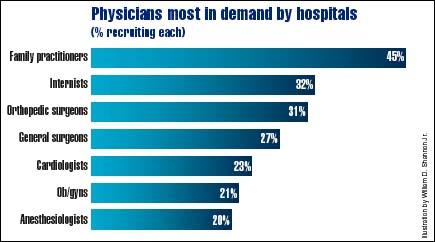Article
Practice Beat
Medical marijuana, Reimbursement, Hospital recruitment, Medical education
Practice Beat
Joan R. Rose
MEDICAL MARIJUANA
Good and bad news
By a 3:2 margin, Arizonans have rejected an initiative that would have made marijuana available to sick patients through the state Department of Public Safety. Although proponents of the measure touted it as a medical measure, opponents hammered away at provisions that would have decriminalized possession of small amounts of the drug.
In 1996 and 1998, Arizona voters approved propositions permitting the use of marijuana for medical reasons. But state lawmakers repealed the medical portion of the '96 initiative, and the Feds blocked implementation of the '98 measure by threatening to revoke a physician's license to prescribe controlled substances if he prescribed or recommended the drug to his patients.
Now a federal appeals courtruling on a California casehas determined that the federal government's policy interferes with the free-speech rights of doctors and patients. The court also prohibited the Feds from initiating any investigation merely because a doctor in his best medical judgment recommends the drug to a patient. In all, nine statesAlaska, Arizona, California, Colorado, Hawaii, Maine, Nevada, Oregon and Washingtonhave approved medical marijuana.
REIMBURSEMENT
Get ready to collect from Cigna?
Cigna HealthCare, the insurance giant that covers medical care for more than 14 million people, agreed late last month to settle a class action suit brought in Illinois on behalf of potentially hundreds of thousands of physicians. The settlement has been opposed by some of the state medical societies involved in a larger class action suit against Cigna and other payers in Miami.
The suit charged that the insurer underpaid physicians by arbitrarily downcoding or paying less than the worth of the services provided. The company has agreed to appoint a third-party administrator to review overdue claims and to pay interest on late claims. Plaintiffs lawyers estimate that Cigna could end up paying $200 million.
At press time, however, several state medical societies, including those in California, Florida, Georgia, and Texas, appear likely to contest the settlement. They're disappointed with the offer and fear that the settlement could preclude physicians from making claims in the broader suit now under way in federal District Court in Miami.
MEDICAL EDUCATION
The Feds pass on limiting residents' hours
The Occupational Safety and Health Administration has denied a petition to impose mandatory restrictions on the hours that medical residents work. OSHA has opted instead to rely on voluntary standards proposed by the Accreditation Council for Graduate Medical Education.
Public Citizen, along with the American Medical Student Association and the Committee of Interns and Residents, had sought to limit residents to an 80-hour workweek, with one day off each week, and no shift longer than 24 hours. Contending that ACGME's standards don't go far enough, the groups are now supporting legislation in Congress that would further restrict residents' work loads.
HOSPITAL RECRUITMENT
Primary care physicians are in demand
Physician recruiting is a top priority for hospitals, according to a survey by Merritt, Hawkins & Associates. More than 85 percent of hospitals surveyed by the Texas-based recruitment and consulting firm are actively seeking physiciansand 56 percent of the rest plan to do so within the next six months. Family physicians top the most-wanted list, with internists not far behind.

The author is a Contributing Writer.
Joan Rose. Practice Beat. Medical Economics 2002;24:13.





